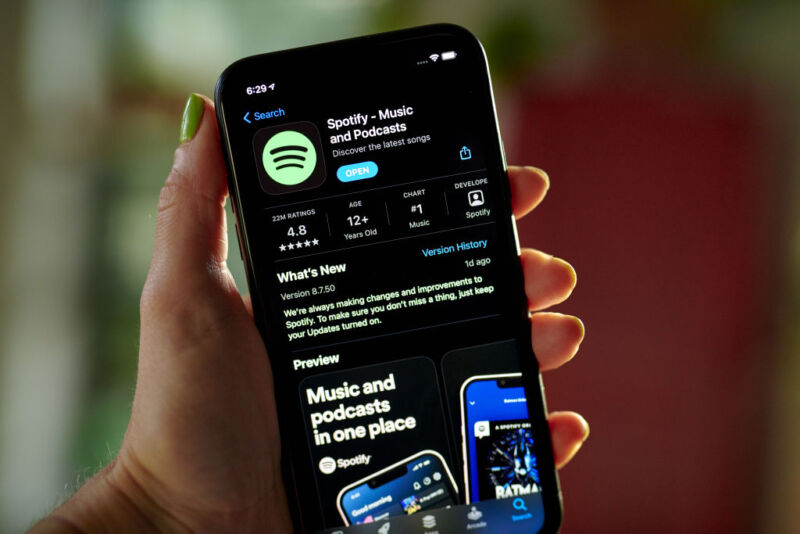Apple plans to appeal, insisting there’s no evidence of consumer harms.

The European Commission (EC) has sided with Spotify, fining Apple nearly $2 billion for abusive App Store restrictions on developers that it found violated antitrust laws by degrading music streaming apps (other than Apple Music) and spiking prices.
“Apple applied restrictions on app developers preventing them from informing iOS users about alternative and cheaper music subscription services available outside of the app (‘anti-steering provisions’),” the EC found.
“This is illegal under EU antitrust rules” and harms consumers “who cannot make informed and effective decisions on where and how to purchase music streaming subscriptions for use on their device,” the EC said.
It’s the first time that the EC has ever fined Apple, and the fine is four times higher than what was expected. Obviously, Apple is not happy about any of it, insisting—in a blog confirming that Apple plans to appeal—that there is no evidence of either consumer harm or anti-competitive behavior.
“The decision was reached despite the Commission’s failure to uncover any credible evidence of consumer harm and ignores the realities of a market that is thriving, competitive, and growing fast,” Apple’s blog said.
In the blog, Apple accuses the EC of cooperating with Spotify, meeting over 65 times to conduct “an investigation with little grounding in reality.” And Apple says Spotify is actually one of the biggest benefactors of the App Store ecosystem.
“Today’s decision just cements the dominant position of a successful European company that is the digital music market’s runaway leader,” Apple’s blog said.
According to the EC, however, Apple was guilty of “unfair trading conditions” that banned developers from advertising cheaper subscriptions available outside the App Store, informing users about available price differences, providing links to cheaper subscription options, or even emailing app users about cheaper options.
“Apple bans music streaming app developers from fully informing iOS users about alternative and cheaper music subscription services available outside of the app and from providing any instructions about how to subscribe to such offers,” the EC concluded.Advertisement
The EC said that Apple’s conduct may have led many users to pay more for music streaming subscriptions and could have caused non-monetary harms by degrading the user experience on music streaming apps.
An EC spokesperson told Ars that investigators “calculated that, in the European Economic Area, around 1.5 million subscribers to the main music streaming apps—other than Apple Music—on iPhones and iPads ended up paying 2–3 euros per month more as of July 2023 and throughout the entire duration of the subscription, compared to what they could have paid outside of the app. This was due to the in-app commissions imposed by Apple on developers, which were then passed on to consumers through higher subscription fees.”
But the non-monetary harms were considered more significant. The EC said it imposed the approximately $1.95 billion fine after determining that a steep fine was the only way to deter Apple and other app stores from repeating these anti-competitive behaviors.
“Apple prohibited app developers from advertising alternative music streaming subscription offers within the app and from including in their apps links which would direct consumers to their websites,” the EC’s spokesperson said. “This prevented many consumers from effectively choosing the subscription offer most suitable to them. For example, the decision shows that 21 percent of the consumers that would have otherwise subscribed to a Spotify premium service did not do so because of Apple’s anti-steering provisions and the resulting degraded experience.”
Margrethe Vestager, the EC’s executive vice president in charge of competition policy, said that Apple has gotten away with abusing music streaming apps for a decade. She ordered Apple to remove its anti-steering rules and refrain from repeat infringement, concluding that Apple’s current practices violated an EU antitrust law that prohibits unfair trade conditions such as imposing unfair purchase or selling prices.
In a blog post, Spotify celebrated the decision but said that because “Apple has routinely defied laws and court decisions in other markets,” Spotify will continue pushing for fair treatment in the App Store outside the EU.
“While we are pleased that this case delivers some justice, it does not solve Apple’s bad behavior towards developers beyond music streaming in other markets around the world,” Spotify’s blog said.
Spotify declined Ars’ request to comment on any changes iOS users in the EU can expect as a result of this decision. Apple declined to comment beyond pointing to statements in its blog.
Apple plans to appeal
Apple maintains that “the facts simply don’t support this decision” and continues to argue that Spotify and the majority of other app developers pay nothing to benefit from App Store tools that help apps thrive.
In its defense, Apple argued that developers can already inform users of cheaper options, writing that in response to developer feedback, Apple updated its rules so that “music app developers can even include information about other offers available outside of their app, along with a link directing users to a website to create and manage their account.”
According to Apple, the App Store’s commissions fuel technology that powers innovation from app developers whom it claims mostly avoid paying fees. Its engineering ensures that developers can experiment with apps using TestFlight and feel confident that their apps will “work seamlessly” with Siri or AirPlay, Apple argued. And the App Store’s API can also be accessed to ensure apps can connect with Bluetooth or “play audio in the background of a user’s device.”
“Today, Spotify has a 56 percent share of Europe’s music streaming market—more than double their closest competitor’s—and pays Apple nothing for the services that have helped make them one of the most recognizable brands in the world,” Apple said.
Apple said it only collects a commission “when a user buys a paid app from the App Store or an in-app digital good or service,” and Spotify long ago chose to dodge paying App Store fees by exclusively selling subscriptions on the web.Advertisement
“When it comes to doing business, not everyone’s going to agree on the best deal,” Apple’s blog said. “But it sure is hard to beat free.”
However, Spotify told the EU that Apple’s rules were blocking music apps from important benefits.
“Apple’s rules muzzled Spotify and other music streaming services” by blocking “various benefits” that “of course” don’t apply to Apple Music. These include “denying us the ability to communicate” with users “about how to upgrade and the price of subscriptions, promotions, discounts, or numerous other perks,” Spotify said.
Apple claims that Spotify filed its complaint in 2019 out of a desire “to rewrite the rules of the App Store—in a way that advantages them even more.”
“Spotify wants to bend the rules in their favor by embedding subscription prices in their app without using the App Store’s In-App Purchase system,” Apple’s blog said. “They want to use Apple’s tools and technologies, distribute on the App Store, and benefit from the trust we’ve built with users—and to pay Apple nothing for it.”
Apple appears particularly frustrated that the EC ordering Apple to remove restrictions in this case seems to enforce the Digital Markets Act (DMA) ahead of that law coming into force this week. (The DMA requires gatekeepers like Apple to allow businesses to promote offers and “conclude contracts” “outside the gatekeeper’s platform.”)
“Apple is set to comply with the DMA in days, and our plans include changes to the rules challenged here,” Apple’s blog said. “What’s clear is that this decision is not grounded in existing competition law. It’s an effort by the Commission to enforce the DMA before the DMA becomes law.”
While Apple begins working on its appeal and Spotify eyes other markets to file more complaints, the EC’s spokesperson underlined to Ars that “this an antitrust decision, not a DMA one.”



